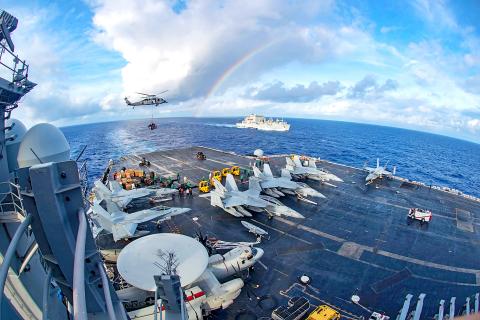A US aircraft carrier strike group has begun patrols in the South China Sea amid concerns the disputed waterway could become a flashpoint under the new US administration.
The US Navy said the force, including the Nimitz-class aircraft carrier USS Carl Vinson, began routine operations in the South China Sea on Saturday.
The announcement was posted on the Vinson’s Facebook page.

Photo: AFP
It said that the ships and aircraft had recently conducted exercises off Hawaii and Guam to “maintain and improve their readiness and develop cohesion as a strike group.”
The strike group’s commander, Rear Admiral James Kilby, said that weeks of training in the Pacific had improved the group’s effectiveness and readiness.
“We are looking forward to demonstrating those capabilities while building upon existing strong relationships with our allies, partners and friends in the Indo-Asia-Pacific region,” he was quoted as saying by the US Navy News Service.
China wrapped up its own naval exercises in the South China Sea on Friday.
It lays claim to almost all of the South China Sea, but Taiwan, Brunei, Malaysia, the Philippines and Vietnam also claim parts.
The US has criticized Beijing’s construction of artificial islands and build-up of military facilities in the sea.
The Chinese Ministry of Foreign Affairs last week said ships and aircraft were allowed to operate in the area according to international law.
However, Beijing “firmly opposes any country’s attempt to undermine China’s sovereignty and security in the name of the freedom of navigation and overflight,” ministry spokesman Geng Shuang (耿爽) said on Wednesday, responding to reports that the Vinson was headed to the South China Sea.
“We also urge the US to refrain from challenging China’s sovereignty and security and to respect regional countries’ efforts to maintain peace and stability in the South China Sea,” he said.
The Vinson has deployed to the South China Sea 16 times in its 35-year history, the US Navy said.

Right-wing political scientist Laura Fernandez on Sunday won Costa Rica’s presidential election by a landslide, after promising to crack down on rising violence linked to the cocaine trade. Fernandez’s nearest rival, economist Alvaro Ramos, conceded defeat as results showed the ruling party far exceeding the threshold of 40 percent needed to avoid a runoff. With 94 percent of polling stations counted, the political heir of outgoing Costa Rican President Rodrigo Chaves had captured 48.3 percent of the vote compared with Ramos’ 33.4 percent, the Supreme Electoral Tribunal said. As soon as the first results were announced, members of Fernandez’s Sovereign People’s Party

MORE RESPONSIBILITY: Draftees would be expected to fight alongside professional soldiers, likely requiring the transformation of some training brigades into combat units The armed forces are to start incorporating new conscripts into combined arms brigades this year to enhance combat readiness, the Executive Yuan’s latest policy report said. The new policy would affect Taiwanese men entering the military for their compulsory service, which was extended to one year under reforms by then-president Tsai Ing-wen (蔡英文) in 2022. The conscripts would be trained to operate machine guns, uncrewed aerial vehicles, anti-tank guided missile launchers and Stinger air defense systems, the report said, adding that the basic training would be lengthened to eight weeks. After basic training, conscripts would be sorted into infantry battalions that would take

GROWING AMBITIONS: The scale and tempo of the operations show that the Strait has become the core theater for China to expand its security interests, the report said Chinese military aircraft incursions around Taiwan have surged nearly 15-fold over the past five years, according to a report released yesterday by the Democratic Progressive Party’s (DPP) Department of China Affairs. Sorties in the Taiwan Strait were previously irregular, totaling 380 in 2020, but have since evolved into routine operations, the report showed. “This demonstrates that the Taiwan Strait has become both the starting point and testing ground for Beijing’s expansionist ambitions,” it said. Driven by military expansionism, China is systematically pursuing actions aimed at altering the regional “status quo,” the department said, adding that Taiwan represents the most critical link in China’s

EMERGING FIELDS: The Chinese president said that the two countries would explore cooperation in green technology, the digital economy and artificial intelligence Chinese President Xi Jinping (習近平) yesterday called for an “equal and orderly multipolar world” in the face of “unilateral bullying,” in an apparent jab at the US. Xi was speaking during talks in Beijing with Uruguayan President Yamandu Orsi, the first South American leader to visit China since US special forces captured then-Venezuelan president Nicolas Maduro last month — an operation that Beijing condemned as a violation of sovereignty. Orsi follows a slew of leaders to have visited China seeking to boost ties with the world’s second-largest economy to hedge against US President Donald Trump’s increasingly unpredictable administration. “The international situation is fraught